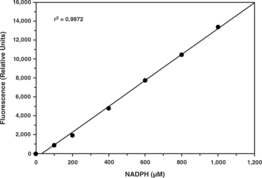Territorial Availability: Available through Bertin Technologies only in France
- Correlated keywords
- kits assays measures measurements Glucose 6 six phosphates Glucose-6-phosphates dehydrogenases cytosolic enzymes catalyzes pentose pathway ribose-5-phosphates precursor RNA ribonucleic acids DNA deoxyribonucleic ATP adenosine triphosphates CoA coenzymes A NAD nicotinamides adenine dinucleotides FAD flavin NADPH phosphates energy cells fatty oxidations lipids biosynthesis substrates oxidases macrophages polymorphonuclear leukocytes oxygen radicals pathogens intracellular metabolic de novo amino red blood RBC mitochondria pentose oxidative damage stress hemolytic anemia neonatal hyperbilirubinemia acute hemolysis chronic X-linked sex-linked hereditary genetics defect mutations G6PD genes malaria Plasmodium falciparum upregulated rat mouse murine obesity hyperglycemia hyperinsulinemia mediator insulin resistance post-translationally preneoplastic lesions tumors suppressors p53 human dimers fluorescence-based erythrocytes lysates tissues homogenates cultures samples 6-phospho-D-gluconate fluorometrics fluorescent
- Product Overview:
Glucose-6-phosphate dehydrogenase (G6PDH) is a cytosolic enzyme that catalyzes the first step in the pentose phosphate pathway. This pathway includes converting glucose to ribose-5-phosphate, a precursor to RNA, DNA, ATP, CoA, NAD, and FAD. The pathway also generates NADPH. G6PDH deficiency, the most common enzyme deficiency worldwide, causes a spectrum of diseases including neonatal hyperbilirubinemia, acute hemolysis, and chronic hemolysis. G6PDH activity has been shown to be upregulated in rat and mouse models of obesity, hyperglycemia, and hyperinsulinemia. Cayman’s Glucose-6-Phosphate Dehydrogenase Assay provides a fluorescence-based method for detecting G6PDH activity in a variety of samples including erythrocyte lysates, tissue homogenates, and cell culture samples.
Cayman Chemical’s mission is to help make research possible by supplying scientists worldwide with the basic research tools necessary for advancing human and animal health. Our utmost commitment to healthcare researchers is to offer the highest quality products with an affordable pricing policy.
Our scientists are experts in the synthesis, purification, and characterization of biochemicals ranging from small drug-like heterocycles to complex biolipids, fatty acids, and many others. We are also highly skilled in all aspects of assay and antibody development, protein expression, crystallization, and structure determination.
Over the past thirty years, Cayman developed a deep knowledge base in lipid biochemistry, including research involving the arachidonic acid cascade, inositol phosphates, and cannabinoids. This knowledge enabled the production of reagents of exceptional quality for cancer, oxidative injury, epigenetics, neuroscience, inflammation, metabolism, and many additional lines of research.
Our organic and analytical chemists specialize in the rapid development of manufacturing processes and analytical methods to carry out clinical and commercial GMP-API production. Pre-clinical drug discovery efforts are currently underway in the areas of bone restoration and repair, muscular dystrophy, oncology, and inflammation. A separate group of Ph.D.-level scientists are dedicated to offering Hit-to-Lead Discovery and Profiling Services for epigenetic targets. Our knowledgeable chemists can be contracted to perform complete sample analysis for analytes measured by the majority of our assays. We also offer a wide range of analytical services using LC-MS/MS, HPLC, GC, and many other techniques.
Accreditations
ISO/IEC 17025:2005
ISO Guide 34:2009
Cayman is a leader in the field of emerging drugs of abuse, providing high-purity Schedule I-V Controlled Substances to federally-licensed laboratories and qualified academic research institutions for forensic analyses. We are certified by ACLASS Accreditation Services with dual accreditation to ISO/IEC 17025:2005 and ISO Guide 34:2009.





